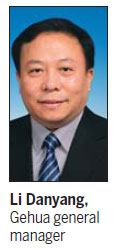

|
Government officials and business representatives break ground on the Beijing Freeport of Culture on March 11. Photos Provided to China Daily |

Area to become Asia's largest base for art, creative industries
Beijing Gehua Cultural Development Group broke ground on Asia's largest cultural product and artwork trading center on March 11 in the Beijing Tianzhu Free Trade Zone.
Gehua, which literally means "song of China", invested 5 billion yuan ($769.2 million) in the area, which is planned to cover 17.3 hectares.
The center, which has a construction area of 500,000 square meters, is expected to bring in 50 billion yuan in revenue after its completion in 2015, said Gehua General Manager Li Danyang.
Because it is located in the free trade zone, the base is named the Beijing Freeport of Culture and has been designated a National Cultural Trade Base by the Ministry of Culture.
Li said the estimate of 50 billion yuan for annual revenue was only a "conservative" prediction.
Li also predicted that the center will become the world's largest cultural product and artwork trading center in terms of "total space, market coverage and functions."
Since it announced plans to build the cultural free trade area, Gehua has been in close contact with the world's top art traders and artwork storage professionals, including a leading Swiss firm responsible for storing many of the world's premier art treasures.
Li said one key highlight of the center will be its bonded tax policy, which follows the norms of international trade policy and laws.
"It will help enterprise deduct guaranty fees during the trading of artwork," he said.
Statistics indicate that investments from China account for 40 percent of the world's cultural product trade, so the establishment of such a hub is set to help reduce large expenditures for professional traders.
The center will encourage the return of looted cultural and historic relics of ancient China from overseas, said the general manager, who used to be a history researcher.
In addition, the center will boast multiple functions.
Large and separate zones have been designated for exhibitions and trade in emerging business fields that businesspeople are eager to cash in on, such as luxury products, films and TV series, performance equipment leasing, artwork authentication and the manufacture of creative products.
Li also has a higher vision for the center.
"We have even set our sights on an offshore financial trade market for the cultural sector and more innovative capital approaches," he said.
Given the tendency of local governments to mimic the success of other regions, Li said the country's first freeport for the cultural industry may soon be copied by other places.
After the completion of the center, Gehua will be in a partnership with the world's leading transportation, logistics, insurance companies to ensure it maintains a leading position in the global cultural industry.
Zhao Shaohua, deputy cultural minister, noted that the freeport and cultural base will act as a spearhead to bring Chinese culture overseas.
Zhao said she expects it to accumulate experience to guide future development, and she promised that the ministry will continue researching new policies for the zone.
Gehua, established in Beijing in 1997, aims for its total capital scale and revenue to each top 10 billion yuan during the 12th Five-Year Plan period (2011-2015). During this ongoing period, the Chinese government has launched a pivotal strategy to boost the cultural sector.
Gehua general manager Li, 50, is a historian who once worked as an official of the Ministry of Education and as vice-president of a private university in Beijing.
yangcheng@chinadaily.com.cn
(China Daily 03/20/2012 page15)